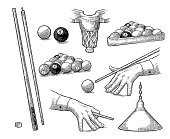Pool Table Cloth Types - Billiards and Pool Principles, Techniques, Re…
페이지 정보
작성자 Irwin Trainor 댓글 0건 조회 2회 작성일 24-11-07 11:30본문
However, there are various different forms of materialism, not all of them Marx’s. In particular, it has been a standard part of "traditional" Marxist philosophy to criticise mechanical forms of materialism and to insist that a dialectical form of materialism is needed in order to comprehend the complexity and richness of concrete historical processes. For, in contrast to the tendency of much recent Marxist writing, Cohen strongly emphasises the materialistic and deterministic character of Marx’s theory of history. The major purpose of Cohen’s book is to develop and defend a particular interpretation of historical materialism, the Marxist theory of historical development. However, although Cohen’s analyses of the meanings of particular terms are often very helpful and instructive, the general picture that emerges of Marx’s theory is more questionable. The effect of this method is to produce a fragmented and atomised picture of reality. It has the effect of fragmenting the world into a disconnected series of atomic particulars and, thereby, producing a mechanical account of reality.

By contrast, the analytical approach, with its logic of external relations, has the effect of removing things from their context and producing an abstract account of them. Cohen’s account of Marxism is very closely based on Marx’s 1859 "Preface". I shall do so by focusing critically on G. A. Cohen’s account of Marxism in Karl Marx’s Theory of History: A Defence. Cohen’s use of the analytic method and his rejection of dialectic leads him to give a systematically distorted account of Marx’s theory of history, which is neither faithful to Marx’s own thought, nor adequate for an understanding of the concrete reality of history. However, against Cohen I will argue that dialectic is the necessary basis for a satisfactory theory of history and an indispensable part of Marx’s thought. Clarity and rigour are the virtues of good philosophy, of good thought in all fields; they are no monopoly of analytical philosophy. Answers will vary among players regarding how often you should chalk your cue stick, but a good rule to follow is to chalk every, and if not every other shot.
Cohen’s work has these virtues to a high degree; but that is because it is good philosophy, not because it is in the analytical tradition. However, these virtues are not peculiar to twentieth-century analytical philosophy; indeed, they are not even particularly characteristic of it. For, as well as presenting an interpretation of historical materialism, he is attempting to vindicate the analytical method in philosophy; and although he does not say it in so many words, it is apparent that he regards this as irreconcilable with the dialectical aspects of Marx’s work. For in the concrete historical process itself, different aspects and features separate themselves. The mode of production of material life conditions the social, political and intellectual life process in general. Nothing is cloudier and less helpful than the attempt to merge all distinctions together and insist that, in reality, "all is one." "As though," in Marx’s words, "this separation had forced its way from the textbook into real life and not, on the contrary, from real life into the textbooks". A machine is regarded in this way by the physicist or the engineer. Indeed, dialectic goes further and insists that analysis should not be regarded as a merely intellectual and mental process, as a purely conceptual and logical activity, the work of thought alone.
Anyone who has read a representative selection of work in this tradition will be well aware that, all too often, it is needlessly obscure in style, cloudy in thought and not noticeably more rigorous in argument than the work of any other major school of philosophy. It rejects the exclusive, rigid, absolute, either/or distinctions of analytical thought. For dialectic, concrete and particular things are always and essentially related, connected to and interacting with other things within a larger totality. The set of economic relations prevailing in a particular society constitutes its economic structure, its economic basis. The basis of this hostility is not far to seek. People love to play games. To me, "God" is love. He insists upon separating and isolating the different elements and aspects of the given concrete totality, What is billiard cue and considering and defining these in isolation. No doubt it is possible to remove a machine entirely from its surrounding social relations and consider it purely abstractly and in isolation. The sum total of these relations of production constitutes the economic structure of society, the real basis, on which arises a legal and political superstructure, and to which correspond definite forms of social consciousness.
댓글목록
등록된 댓글이 없습니다.